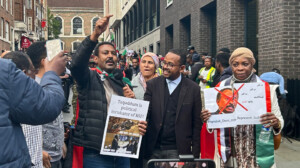USA may target Sudan officials with sanctions
A US State Department official said on Tuesday that Washington is considering possible sanctions, if there will be more violence against protesters in Sudan.
“We’re looking at all options, including sanctions down the line should there be any kind of repeat of violence,” Makila James, deputy assistant secretary for East Africa and the Sudans, told a US House of Representatives hearing.
Reuters reported on Tuesday that the sanctions could include visa sanctions or economic sanctions. “We want to use the right tool and we want to target the right people,” James said.
 Makila James, Deputy Assistant Secretary for East Africa and The Sudans since September 17, 2018 (US State Dept)
Makila James, Deputy Assistant Secretary for East Africa and The Sudans since September 17, 2018 (US State Dept)
A US State Department official said on Tuesday that Washington is considering possible sanctions, if there will be more violence against protesters in Sudan.
“We’re looking at all options, including sanctions down the line should there be any kind of repeat of violence,” Makila James, deputy assistant secretary for East Africa and the Sudans, told a US House of Representatives hearing.
Reuters reported on Tuesday that the sanctions could include visa sanctions or economic sanctions. “We want to use the right tool and we want to target the right people,” James said.
Washington made clear “in very strong terms” that a military government will not be acceptable.
US delegation
The Transitional Military Council (TMC), that took over power from President Al Bashir in a military coup on April 11, has been suspending negotiations about the composition of a new government with the Alliance for Freedom and Change, after an initial agreement was reached on a three-year transitional period on May 13.
On June 3, the sit-in in front of the army command in Khartoum, demanding the junta’s handover of power to a civilian-led government, was violently dismantled. More than 100 protesters were reportedly killed.
A week later, the State Department appointed veteran diplomat Donald Booth as Special Envoy for Sudan. He and US Assistant Secretary of State Tibor Nagy visited Khartoum mid-June.
In a statement after their visit, Nagy said they support the main demands of the opposition, consisting of a civilian-led interim government of technocrats for about four years, in order to restore the financial and economic situation and the Rule of Law in the country, after which general elections will be held.
The US delegation lauded the stance of the African Union, its suspension of Sudan’s AU membership from the AU, and also welcomed the mediation efforts by Ethiopia.
Financial support
The TMC deputy chairman and commander of the paramilitary Rapid Support Forces (RSF), Mohamed Hamdan, better known as Hemeti, said earlier this week that Sudan provides “the largest force” in the Saudi-led alliance against the Houthi rebels in Yemen.
Most of the Sudanese troops fighting in Yemen are RSF militiamen. The New York Times reported in December last year that many of them are minors recruited from Darfur. The TMC is supported by Saudi Arabia and the United Arab Emirates (UAE). The two countries offered Khartoum $3 billion in aid after the coup.
According to US official Makila James, Saudi Arabia and the UAE have told US officials that they want a civilian-led interim government, because anything else may lead to broader regional instability.
Earlier this month, founders of the Enough activist think-tank, George Clooney and John Prendergast noted that the military junta still enjoy support from Gulf Arab states, China and Russia. “By creating significant financial consequences for regime leaders and their commercial collaborators, diplomats from Africa, Europe and the United States will be able to to influence the cost-benefit calculus of Khartoum's generals,” they stated.
Our editorial independence means that we can continue to provide factual updates about ongoing protests to Sudanese and international actors, educate people about how to avoid outbreaks of infectious diseases, and provide a window to the world for those in all corners of Sudan. Support Radio Dabanga for as little as €2.50, the equivalent of a cup of coffee.












 and then
and then